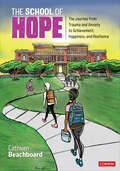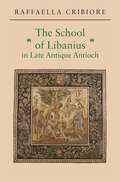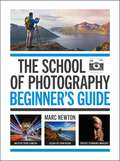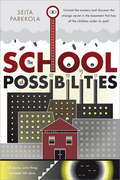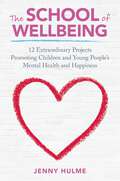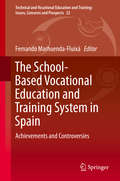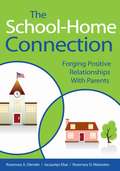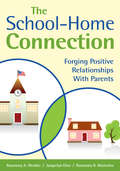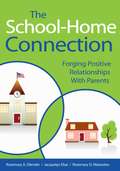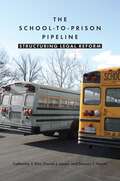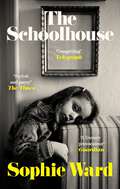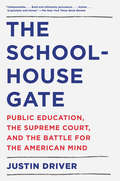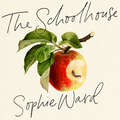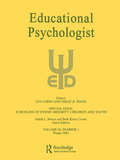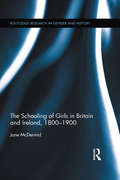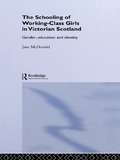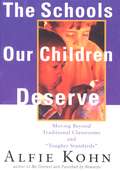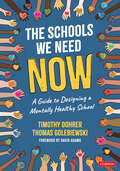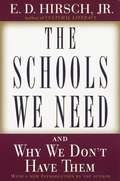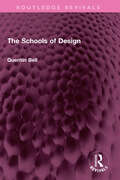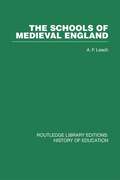- Table View
- List View
The School of Hope: The Journey From Trauma and Anxiety to Achievement, Happiness, and Resilience
by Cathleen BeachboardDiscover how to improve achievement, happiness, and resilience using the science of hope The current mental health crisis is driving many teachers to leave the profession while students struggle with engagement and anxiety. Trauma-informed coping mechanisms are helpful, but this book goes a step further by incorporating much-needed but often-missing support to help learners feel hopeful and provide educators with resources to care for themselves. Based on research around the psychological science of hope, this guidebook provides strategies educators and school leaders can use daily to help students feel secure, build relationships, and improve academic outcomes. Included are practices and interventions that can be woven into classrooms and schools to foster mental wellness and happiness using Classroom materials, tools, and reproducibles Scientific resources to quickly assess and monitor hope Simple plans of action to improve hope, engagement, and motivation Vignettes from classrooms and the author’s own experiences with children who have experienced extreme trauma Backed by the latest research, The School of Hope will encourage higher academic attainment and equity, inspiring a sense of deeper fulfillment for both students and educators.
The School of Hope: The Journey From Trauma and Anxiety to Achievement, Happiness, and Resilience
by Cathleen BeachboardDiscover how to improve achievement, happiness, and resilience using the science of hope The current mental health crisis is driving many teachers to leave the profession while students struggle with engagement and anxiety. Trauma-informed coping mechanisms are helpful, but this book goes a step further by incorporating much-needed but often-missing support to help learners feel hopeful and provide educators with resources to care for themselves. Based on research around the psychological science of hope, this guidebook provides strategies educators and school leaders can use daily to help students feel secure, build relationships, and improve academic outcomes. Included are practices and interventions that can be woven into classrooms and schools to foster mental wellness and happiness using Classroom materials, tools, and reproducibles Scientific resources to quickly assess and monitor hope Simple plans of action to improve hope, engagement, and motivation Vignettes from classrooms and the author’s own experiences with children who have experienced extreme trauma Backed by the latest research, The School of Hope will encourage higher academic attainment and equity, inspiring a sense of deeper fulfillment for both students and educators.
The School of Libanius in Late Antique Antioch
by Raffaella CribioreThis book is a study of the fourth-century sophist Libanius, a major intellectual figure who ran one of the most prestigious schools of rhetoric in the later Roman Empire. He was a tenacious adherent of pagan religion and a friend of the emperor Julian, but also taught leaders of the early Christian church like St. John Chrysostom and St. Basil the Great. Raffaella Cribiore examines Libanius's training and personality, showing him to be a vibrant educator, though somewhat gloomy and anxious by nature. She traces how he cultivated a wide network of friends and former pupils and courted powerful officials to recruit top students. Cribiore describes his school in Antioch--how students applied, how they were evaluated and trained, and how Libanius reported progress to their families. She details the professional opportunities that a thorough training in rhetoric opened up for young men of the day. Also included here are translations of 200 of Libanius's most important letters on education, almost none of which have appeared in English before. Cribiore casts into striking relief the importance of rhetoric in late antiquity and its influence not only on pagan intellectuals but also on prominent Christian figures. She gives a balanced view of Libanius and his circle against the far-flung panorama of the Greek East.
The School of Oriental and African Studies
by Ian BrownThe School of Oriental and African Studies, a college of the University of London, was established in 1916 principally to train the colonial administrators who ran the British Empire in the languages of Asia and Africa. It was founded, that is, with an explicitly imperial purpose. Yet the School would come to transcend this function to become a world centre of scholarship and learning, in many important ways challenging that imperial origin. Drawing on the School's own extensive administrative records, on interviews with current and past staff, and on the records of government departments, Ian Brown explores the work of the School over its first century. He considers the expansion in the School's configuration of studies from the initial focus on languages, its changing relationships with government, and the major contributions that have been made by the School to scholarly and public understandings of Asia, Africa, and the Middle East.
The School of Photography: The ultimate introduction to photographic practice
by Marc NewtonThe School of Photography: Beginner's Guide will take the beginner photographer to an advanced level in no time and fill any gaps in photography knowledge that may be holding you back from reaching your full potential. You'll be able to use your camera confidently in all the manual modes and apply the knowledge gained to any situation. The book will make you feel completely confident and ensure your shots stack up against any professional-looking photography.It's for people who want to take photography more seriously and will suit beginners, keen enthusiasts or anyone looking to make photography their profession. This book will put an end to any confusion, while giving you accurate and thorough knowledge in photography.Topics covered include:- Camera kits and equipment- Working in manual settings- Composition- Apertures and depth of field- Shutter speeds- Night photography
The School of Photography: The ultimate introduction to photographic practice
by Marc NewtonThe School of Photography: Beginner's Guide will take the beginner photographer to an advanced level in no time and fill any gaps in photography knowledge that may be holding you back from reaching your full potential. You'll be able to use your camera confidently in all the manual modes and apply the knowledge gained to any situation. The book will make you feel completely confident and ensure your shots stack up against any professional-looking photography.It's for people who want to take photography more seriously and will suit beginners, keen enthusiasts or anyone looking to make photography their profession. This book will put an end to any confusion, while giving you accurate and thorough knowledge in photography.Topics covered include:- Camera kits and equipment- Working in manual settings- Composition- Apertures and depth of field- Shutter speeds- Night photography
The School of Possibilities
by Seita ParkkolaStorm Steele is an impossible child. Or so his parents believe thanks to the influence of his evil "step-monster." Now Storm is being forced to attend the School of Possibilities for troubled youth. But Storm notices that something strange is going on at his new school. The students are not. . . normal. Soon he's being spied on, followed by classmates-and worst of all, forced to accept the headmaster's perfectly behaved daughter as his girlfriend. He can feel himself becoming more obedient, more like his classmates. Storm tries to resist, but he doesn't understand how or why the school is controlling him. Can Storm escape-or will he be turned into a zombie of "good" behavior like everyone else around him?
The School of Wellbeing: 12 Extraordinary Projects Promoting Children and Young People's Mental Health and Happiness
by Jenny Hulme Jane Asher Jane Powell Asad Ahmad Gok Wan Kate Griggs Nicky Cox Professor Tanya Byron Rebecca Root Suzy GreavesAs rates of depression, anxiety, self-harm and eating disorders are on the up among young people, how can schools provide appropriate information and support for the young people in their classrooms? How can they bridge the gap between what they know matters - the impact of these issues on learning and life-long health - and the mounting day-to-day priorities and pressures of school life? This book provides unique insight into 12 projects that are helping to answer these questions and supporting teachers to make mental health and emotional wellbeing a key player in the school day. With a mix of longer-term initiatives and simple strategies that schools can put in place immediately, it explores mentoring and mindfulness, social action and sport, Lego play and poetry, the power of parents and the role of PSHE. It describes how these projects work practically and shares the impact they are having, increasing resilience and raising the aspirations and emotional wellbeing of the whole school community. As well as showcasing ideas that are making a difference, the book meets with the education leaders and charities behind the initiatives (including Place2Be, Step up to Serve, Kidscape, Mosaic, Diversity Role Models, Beat, Achievement for All and others) who offer advice and signpost useful information to support readers in getting these ideas off the ground in their schools. This book is a source of inspiration for headteachers, senior leadership teams, pastoral care teams, school counsellors and psychologists.
The School-Based Vocational Education and Training System in Spain: Achievements and Controversies (Technical and Vocational Education and Training: Issues, Concerns and Prospects #32)
by Fernando Marhuenda-FluixáThis book discusses the developments in policy and practice in the field of formal, non-formal and continuing vocational education and training in Spain since 1970. It describes how VET has been transformed and become one of the country’s main areas of pedagogical innovation, and also examines current developments, such as the role of non-formal vocational education and training, the accreditation of vocational qualifications acquired in the non-formal system, and the adoption of dual apprenticeships that bear little resemblance to central European dual systems.Written by respected researchers in these fields, the first section is informative and analytical, offering a description of the system and comments based on academic literature and research. The second section illustrates the research on relevant issues, portraying empirical data from different regions in Spain, as well as nationwide data. Explaining and interpreting data on the basis of the authors’ different theoretical frameworks, the book provides a comprehensive, updated and accurate overview of VET and relevant research in Spain, as well as their relation to European and global developments.
The School-Home Connection
by Rosemary A. Olender Jacquelyn Elias Rosemary D. MastroleoResearch has consistently shown that student success is directly related to the strength of the relationships between parents and schools. In The School-Home Connection, the authors draw on original research and their professional experiences to identify the common sources of both negative and positive school-home relationships. The book presents a comprehensive approach to building closer connections and includes:Tools to help educators develop a deeper understanding of the communities they serveStrategies for improving interpersonal skills and communication skillsA chapter on the importance of documenting and celebrating school eventsGuidelines for creating three distinct levels of parental participation in schoolsWith suggestions for cultivating a community network of support services and a summary of lessons for forging constructive relationships, The School-Home Connection is an essential tool for educators looking to strengthen the learning community and increase student achievement.
The School-Home Connection: Forging Positive Relationships With Parents
by Rosemary A. Olender Jacquelyn Elias Rosemary D. MastroleoDrawing on original research and the authors' professional experiences, this resource presents a comprehensive approach to developing more positive relationships with students and their families.
The School-Home Connection: Forging Positive Relationships with Parents
by Rosemary A. Olender Jacquelyn Elias Rosemary D. MastroleoResearch has consistently shown that student success is directly related to the strength of the relationships between parents and schools. In The School-Home Connection, the authors draw on original research and their professional experiences to identify the common sources of both negative and positive school-home relationships. The book presents a comprehensive approach to building closer connections and includes:Tools to help educators develop a deeper understanding of the communities they serveStrategies for improving interpersonal skills and communication skillsA chapter on the importance of documenting and celebrating school eventsGuidelines for creating three distinct levels of parental participation in schoolsWith suggestions for cultivating a community network of support services and a summary of lessons for forging constructive relationships, The School-Home Connection is an essential tool for educators looking to strengthen the learning community and increase student achievement.
The School-to-Prison Pipeline: Structuring Legal Reform
by Catherine Y. Kim Daniel J. Losen Damon T. HewittAn in-depth analysis of the legal entry points and remedies in the school-to-prison pipelineThe “school-to-prison pipeline” is an emerging trend that pushes large numbers of at-risk youth—particularly children of color—out of classrooms and into the juvenile justice system. The policies and practices that contribute to this trend can be seen as a pipeline with many entry points, from under-resourced K-12 public schools, to the over-use of zero-tolerance suspensions and expulsions and to the explosion of policing and arrests in public schools. The confluence of these practices threatens to prepare an entire generation of children for a future of incarceration.In this comprehensive study of the relationship between American law and the school-to-prison pipeline, co-authors Catherine Y. Kim, Daniel J. Losen, and Damon T. Hewitt analyze the current state of the law for each entry point on the pipeline and propose legal theories and remedies to challenge them. Using specific state-based examples and case studies, the authors assert that law can be an effective weapon in the struggle to reduce the number of children caught in the pipeline, address the devastating consequences of the pipeline on families and communities, and ensure that our public schools and juvenile justice system further the goals for which they were created: to provide meaningful, safe opportunities for all the nation’s children.
The Schoolhouse
by Sophie Ward'The Schoolhouse is taut, gripping and intensely moving right until the very last page. I truly couldn't put Sophie Ward's beautifully written novel down' Susannah Wise, author of This Fragile EarthIsobel lives an isolated life in North London, working at a nearby library. She feels safe if she keeps to her routines and doesn't let her thoughts stray too far into the past. But a newspaper photograph of a missing local schoolgirl and a letter from her old teacher are all it takes for her ordinary, careful armour to become overwhelmed and the trauma of what happened when she was a pupil at The Schoolhouse to return.The Schoolhouse was different - one of the 1970s experimental schools that were a reaction to the formal methods of the past. The usual rules did not apply, and life there was a dark interplay of freedom and violence, adventure and fear. Only her teenage diary recorded what happened, but the truth is coming for her and everything she has tried to protect is put at risk.Set between the past and the present, The Schoolhouse is a masterful and gripping novel about childhood, secrets and trust.
The Schoolhouse Gate: Public Education, the Supreme Court, and the Battle for the American Mind
by Justin DriverAn award-winning constitutional law scholar at the University of Chicago (who clerked for Judge Merrick B. Garland, Justice Stephen Breyer, and Justice Sandra Day O’Connor) gives us an engaging and alarming book that aims to vindicate the rights of public school students, which have so often been undermined by the Supreme Court in recent decades. <P><P>Judicial decisions assessing the constitutional rights of students in the nation’s public schools have consistently generated bitter controversy. From racial segregation to unauthorized immigration, from antiwar protests to compulsory flag salutes, from economic inequality to teacher-led prayer—these are but a few of the cultural anxieties dividing American society that the Supreme Court has addressed in elementary and secondary schools. The Schoolhouse Gate gives a fresh, lucid, and provocative account of the historic legal battles waged over education and illuminates contemporary disputes that continue to fracture the nation. <P><P>Justin Driver maintains that since the 1970s the Supreme Court has regularly abdicated its responsibility for protecting students’ constitutional rights and risked transforming public schools into Constitution-free zones. Students deriving lessons about citizenship from the Court’s decisions in recent decades would conclude that the following actions taken by educators pass constitutional muster: inflicting severe corporal punishment on students without any procedural protections, searching students and their possessions without probable cause in bids to uncover violations of school rules, random drug testing of students who are not suspected of wrongdoing, and suppressing student speech for the viewpoint it espouses. <P><P>Taking their cue from such decisions, lower courts have upheld a wide array of dubious school actions, including degrading strip searches, repressive dress codes, draconian “zero tolerance” disciplinary policies, and severe restrictions on off-campus speech. <P><P>Driver surveys this legal landscape with eloquence, highlights the gripping personal narratives behind landmark clashes, and warns that the repeated failure to honor students’ rights threatens our basic constitutional order. This magisterial book will make it impossible to view American schools—or America itself—in the same way again.
The Schoolhouse: 'Stylish, pacy and genuinely frightening' The Times
by Sophie Ward'A compelling, fast-moving narrative . . . delivers real emotional impact' Telegraph'A literary provocateur' GuardianIsobel lives an isolated life in North London, working at a nearby library. She feels safe if she keeps to her routines and doesn't let her thoughts stray too far into the past. But a newspaper photograph of a missing local schoolgirl and a letter from her old teacher are all it takes for her ordinary, careful armour to become overwhelmed and the trauma of what happened when she was a pupil at The Schoolhouse to return.The Schoolhouse was different - one of the 1970s experimental schools that were a reaction to the formal methods of the past. The usual rules did not apply, and life there was a dark interplay of freedom and violence, adventure and fear. Only her teenage diary recorded what happened, but the truth is coming for her and everything she has tried to protect is put at risk.Set between the past and the present, The Schoolhouse is a masterful and gripping novel about childhood, secrets and trust.
The Schooling of Ethnic Minority Children and Youth: A Special Issue of Educational Psychologist
by Lyn Corno Philip H. WinneFirst published in 2001. Routledge is an imprint of Taylor & Francis, an informa company.
The Schooling of Girls in Britain and Ireland, 1800- 1900 (Routledge Research in Gender and History)
by Jane McDermidThis book compares the formal education of the majority of girls in Britain and Ireland in the nineteenth century. Previous books about ‘Britain’ invariably focus on England, and such ‘British’ studies tend not to include Ireland despite its incorporation into the Union in 1801. The Schooling of Girls in Britain and Ireland, 1800-1900 presents a comparative synthesis of the schooling of working and middle-class girls in the Victorian period, with the emphasis on the interaction of gender, social class, religion and nationality across the UK. It reveals similarities as well as differences between both the social classes and the constituent parts of the Union, including strikingly similar concerns about whether working-class girls could fulfill their domestic responsibilities. What they had in common with middle-class girls was that they were to be educated for the good of others. This study shows how middle-class women used educational reform to carve a public role for themselves on the basis of a domesticated life for their lower class ‘sisters’, confirming that Victorian feminism was both empowering and constraining by reinforcing conventional gender stereotypes.
The Schooling of Working-Class Girls in Victorian Scotland: Gender, Education and Identity (Woburn Education Series)
by Jane McDermidThe portrayal of Scotland as a particularly patriarchal society has traditionally had the effect of marginalizing Scottish women, both teachers and students, in both Scottish and British history. The Schooling of Working-Class Girls in Victorian Scotland examines and challenges this assumption and analyzes in detail the course of events which has led to a more enlightened system. Education was, and is, seen as integral to Scottish distinctiveness, but the Victorian period saw anxious debate about the impact of outside influences at a time when Scottish society seemed to be fracturing. This book examines the gender-blindness of the educational tradition, with its notion of the 'democratic intellect', testing the claim of superiority for the Scottish system, and questioning the assumption that Scottish women were either passive victims or willing dupes of a peculiarly patriarchal ideal. Considering the influences of the related ideologies of patriarchy and domesticity, and the crucial importance of the local and regional economic context, in focusing on female education, this book provides a much wider comparative study of Scottish society during a period of tremendous upheaval and a perceived crisis in national identity, in which women, as well as men, participated.
The Schools Our Children Deserve: Moving Beyond Traditional Classrooms and "Tougher Standards"
by Alfie KohnIn this "lively, provocative and well-researched book" (Theodore Sizer), AlTe Kohn builds a powerful argument against the "back to basics" philosophy of teaching and simplistic demands to "raise the bar." Drawing on stories from real classrooms and extensive research, Kohn shows parents, educators, and others interested in the debate how schools can help students explore ideas rather than filling them with forgettable facts and preparing them for standardized tests. Here at last is a book that challenges the two dominant forces in American education: an aggressive nostalgia for traditional teaching ("If it was bad enough for me, it's bad enough for my kids") and a heavy-handed push for Tougher Standards.
The Schools We Need Now: A Guide to Designing a Mentally Healthy School
by Timothy Dohrer Thomas GolebiewskiPlace mental health at the heart of schooling Our students have always needed our support, but recent events have brought to the forefront the challenges K-12 schools face in supporting their mental health. Now is the time to transform schools into safe and healthy places that enable students not only to learn but thrive. Based on decades of research and proven examples from education professionals and the authors, experts in school leadership and social work, The Schools We Need Now highlights the importance of placing mental health at the heart of schooling and shares a vision for schools that prioritizes student well-being. Inside you’ll discover: Practical ways to improve school climate and mitigate the effects of students’ stress, trauma, depression, and anxiety Preventive activities, school transition and crisis response plans, and community collaboration strategies How to create a comprehensive Mental Health Action Plan that is grounded your school’s culture and climate Examples of schools, classrooms, and organizations that are on the leading edge of creating the schools we need now For every educator who wants to ensure a healthy and equitable school environment for all students, The Schools We Need Now shows you how to create a safe place that protects and supports their academic, social, emotional, and physical growth.
The Schools We Need Now: A Guide to Designing a Mentally Healthy School
by Timothy Dohrer Thomas GolebiewskiPlace mental health at the heart of schooling Our students have always needed our support, but recent events have brought to the forefront the challenges K-12 schools face in supporting their mental health. Now is the time to transform schools into safe and healthy places that enable students not only to learn but thrive. Based on decades of research and proven examples from education professionals and the authors, experts in school leadership and social work, The Schools We Need Now highlights the importance of placing mental health at the heart of schooling and shares a vision for schools that prioritizes student well-being. Inside you’ll discover: Practical ways to improve school climate and mitigate the effects of students’ stress, trauma, depression, and anxiety Preventive activities, school transition and crisis response plans, and community collaboration strategies How to create a comprehensive Mental Health Action Plan that is grounded your school’s culture and climate Examples of schools, classrooms, and organizations that are on the leading edge of creating the schools we need now For every educator who wants to ensure a healthy and equitable school environment for all students, The Schools We Need Now shows you how to create a safe place that protects and supports their academic, social, emotional, and physical growth.
The Schools We Need: And Why We Don't Have Them
by E. D. HirschNow in paperback with a new introduction, The Schools We Need offers a powerful, compelling, and unassailable argument for reforming America's schooling methods and ideas--by one of America's most important educators, and author of the bestselling Cultural Literacy. For over fifty years, American schools have operated under the assumption that challenging children academically is unnatural for them, that teachers do not need to know the subjects they teach, that the learning "process" should be emphasized over the facts taught. All of this is tragically wrong.Renowned educator and author E. D. Hirsch, Jr., argues that, by disdaining content-based curricula while favoring abstract--and discredited--theories of how a child learns, the ideas uniformly taught by our schools have done terrible harm to America's students. Instead of preparing our children for the highly competitive, information-based economy in which we now live, our schools' practices have severely curtailed their ability, and desire, to learn.With an introduction that surveys developments in education since the hardcover edition was published, The Schools We Need is a passionate and thoughtful book that will appeal to the millions of people who can't understand why America's schools aren't educating our children.From the Trade Paperback edition.
The Schools of Design (Routledge Revivals)
by Quentin BellFirst published in 1963, The Schools of Design is a history of English Art Education. The story of the genesis of English art schools is one of the fierce conflicts in which private feuds mingle with questions of principle. It is a story of administrative chaos and open scandal in which some long-forgotten figures are involved; others – such as Haydon, Gladstone, Alfred Stevens, Dyce, Stafford Northcote, Etty and Henry Role – appear in a new role. In itself this forms an entertaining study full of incident and drama. Many of the problems that presented themselves in the 1840’s are still with us today and no one who is interested in the place of art in our society can afford to neglect the lessons of the Schools of Design. This book will be of interest to students of art and history.
The Schools of Medieval England
by A F LeachOriginally published 1915. This reprints the edition of 1969. When originally published this volume was the first history of English schools before the Reformation, reckoned from the accession of Edward VI.
